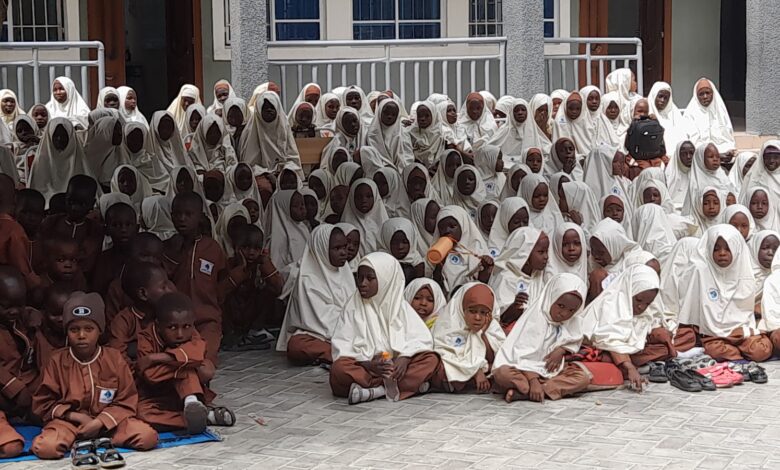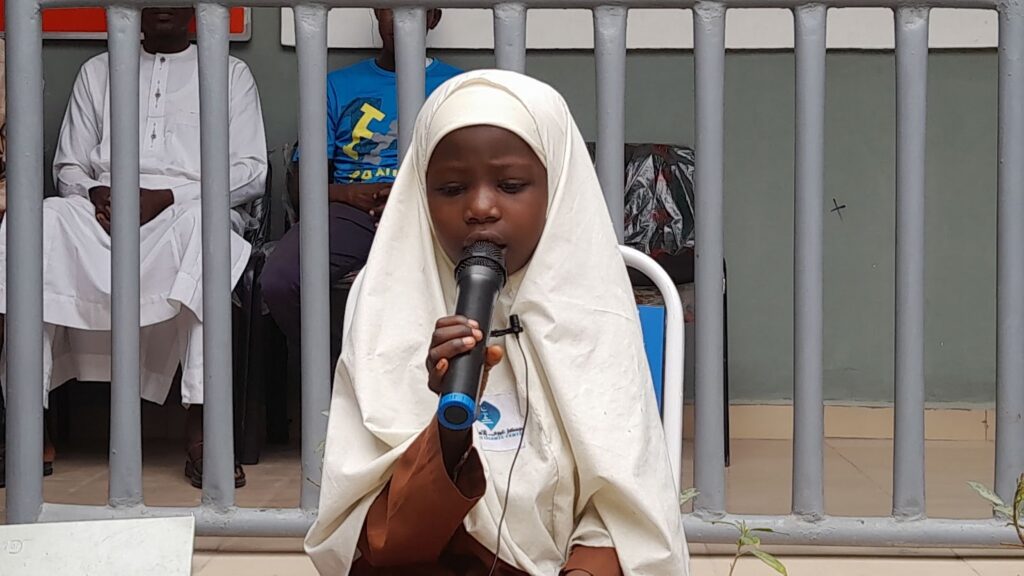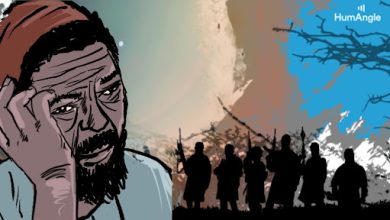The Books Boko Haram Snatched From These Children Are Handed Back To Them
Sadiq Muhammad has nurtured the ambition of becoming an engineer for a long time. Unfortunately, the insurgency that raged on for over a decade in Nigeria's North East truncated it. Now an organisation is finding underprivileged children and teens like him and renewing their hope.

Sadiq Muhammad lost almost everything – his parents, home, and the privilege of an education. He was only 10 years old at the time and in Primary One.
That night unfolded in a tragic sequence, his aunt, Hajja Kaltum, recalled. They had just concluded a family dinner when the sound of gunshots shattered their peace. Initially, there was no sense of panic. They had gotten used to such episodes. “They have been attempting to enter the town many times, but they were not successful, so we thought it was going to be one of those attacks,” Kaltum told HumAngle. But that night turned out to be different. What followed was devastating and would break the community’s resilience.
“That dinner we had was the last time I ever saw my father. I never got to see him again, not even his corpse,” Muhammad said, almost choking on his words.
Those responsible, Boko Haram, forced Muhammad and his surviving relatives to flee Monguno, a town in a local government area of the same name. They found their way to Muna, an Internally Displaced Persons (IDP) camp in Maiduguri, Borno State, northeastern Nigeria.
For seven years, Muhammad was without any education. Slowly, he was beginning to give up on his dream. Then his path crossed with the Guwori Foundation, an organisation that sought out children like him and, after a thorough investigation, sponsored their studies.
Starting over
After losing his parents, Muhammad lived with his uncle, his two brothers, and seven cousins. Feeding such a large family was a struggle for his uncle; therefore school became the least of priorities.
“My uncle really tried, the little money that he gets is used for buying us food. He could not afford to even buy us clothes to wear, let alone send us to school,” Muhammad said. But his craving for school never died.
“I felt really bad whenever I saw my peers going to school and I couldn’t attend because we don’t have the means,” he explained. “I had plans of studying up to the university level to become an engineer.”
But then, in 2020, Muhammad’s life turned around when the admission officer of Guwori Foundation approached him. After an assessment by the organisation which found him eligible for a scholarship, he was offered admission into Primary Five. At age 17, he was too old for that class, but he grasped the opportunity without hesitation.
“I knew I was too old for primary five, but I didn’t care. All I wanted was to gain the knowledge and thank God the path was set for me now,” he said.
Today, Muhammad is in Junior Secondary School Three. He hopes to continue studying hard and make it to the university where he would study engineering, the profession he has always nurtured in his heart.
“I feel very happy and fulfilled, I appreciate the foundation for giving me the chance to become a better person in the future,” he said.
She wanted to become a gynaecologist
Many children have been forced out of school due to the insurgency in the North East. Borno State, which has been the epicentre of the fight against Boko Haram, has about 1.8 million out-of-school children, according to the 2022 Multidimensional Poverty Index.
Like Muhammad, Hadiza Ali Bukar, 14, remained out of school since the tragic death of her father in Baga, a town in Borno State that is close to Lake Chad.
Left with her mother and two brothers, Hadiza’s family struggles to make ends meet. When she was supposed to be at school, she was hawking fried groundnuts to support her family. “I had to stop going to school because my family relied on the money I brought home from hawking to survive,” she told HumAngle.
Once, Hadiza had dreamed of becoming a gynaecologist. “People say there are not many female doctors, that was why I wanted to become a doctor to help fellow women.”
It was at this point that the Guwori Foundation spotted her. She received an offer letter to enrol in a newly established charity school designed specifically for individuals facing socio-economic challenges. Sensing her mother’s reluctance due to the family’s reliance on Hadiza’s income from hawking, the foundation stepped in by providing essential livelihood support for the family. “I was so happy when I learned that I could go to school again,” Hadiza said. She has since successfully rounded off her primary education and is currently in JSS Two.

To curb the limitations to many getting an education in Borno, the government came up with various strategies, but it appears that the problem still looms, HumAngle observed.
“We have built many big schools and added more classrooms, but we still have too many students in each class. It’s a big problem, and even worse, there are many children who should still be in school but are not,” Babagana Zulum, the state governor was quoted as saying in a recent report.
The Guwori Foundation, a nonprofit, was established in 2015 by Mele Kolo Kyari, the current Group Managing Director (GMD) of the Nigerian National Petroleum Corporation (NNPC). It was a response to the decade-long insurgency which caused many children in the state to leave school due to the disruption in their family’s sources of livelihood.
To combat the impact of the crisis on education, the organisation first offered informal lessons to out-of-school children and referred some to formal schools. They also sponsored a number of children to write WAEC and JAMB examinations.
In a bid to reach out to more children, Guwori Islamic Academy, was established by the foundation in 2017. Even though a number of the beneficiaries had already spent a long time outside school and were past primary school age, some of them, like Muhammad, were able to pick up.

The process
Before a child is selected for a scholarship from any community, an assessment is carried out to ascertain if he or she meets the criteria. They are then sponsored to study in the academy. Books, uniforms, sandals and other requirements are provided for them, Dawud Umar, the information Officer explained.
Umar added that the foundation has provided opportunities for over 300 underprivileged children since its establishment, with plans to expand this outreach.
On Aug. 6, 2023, the organisation held its first graduation ceremony for 23 pupils who graduated. All were to continue to secondary school on scholarship.
To acknowledge and add to the work done by the organisation, the Borno State governor pledged the sum of ₦80 million. This meant ₦20 million every year to support its activities.
“Each year, we will release N20m to complement the payment of teachers’ salaries and other expenses. The first ₦20 million cheque will be issued to the school management tomorrow (Monday) in sha Allah,” Zulum had said.
Many need help
Umar explained that while the organisation is poised to help the displaced and less privileged, it is usually overwhelmed by the number of people in need. This makes their selection process difficult in some communities.
“You know there are quite a lot of children out there who are out of school due to the economic situation of the country. Many parents are struggling to pay their children’s school fees or even foot other school-related bills, so whenever an opportunity like this comes up, there is usually a scramble for chances,” Umar told HumAngle, adding that the foundation lacks the capacity to serve all.
“We are limited by size. For instance, we have two classrooms [25 capacity] for every level, so we can only admit a certain number of beneficiaries,” Umar pointed out. Their effort is to reduce the number of out-of-school children in the state as they are incapable of eliminating the problem.

Another challenge is the resistance they face from some parents who have negative notions about formal education. “There are still people who believe their children should not go to a formal school, so we have been dealing with cases whereby we feel a child should start school but then the parent wouldn’t allow their children or wards to go to school due to cultural norms,” he said.
To curb this particular problem, the organisation is working through awareness creation and community engagements, to inform and sensitise communities on the need to educate their children. “Though we are able to convince some to see a reason to allow their children to go to school, some are adamant. So we also do advocacy and awareness raising in the community to encourage these kinds of people to see the importance of education.”
In anticipation of the fulfilment of the state government’s promise, the organisation has laid out a plan to expand its operations. “We already had plans of expanding the school to offer secondary education and also supporting the children through their university education,” Umar continued. “This money will go a long way in supporting our initiative.”
For now, Guwori Foundation sponsors those who have successfully rounded off their primary education to further in other secondary schools.
Support Our Journalism
There are millions of ordinary people affected by conflict in Africa whose stories are missing in the mainstream media. HumAngle is determined to tell those challenging and under-reported stories, hoping that the people impacted by these conflicts will find the safety and security they deserve.
To ensure that we continue to provide public service coverage, we have a small favour to ask you. We want you to be part of our journalistic endeavour by contributing a token to us.
Your donation will further promote a robust, free, and independent media.
Donate HereStay Closer To The Stories That Matter




